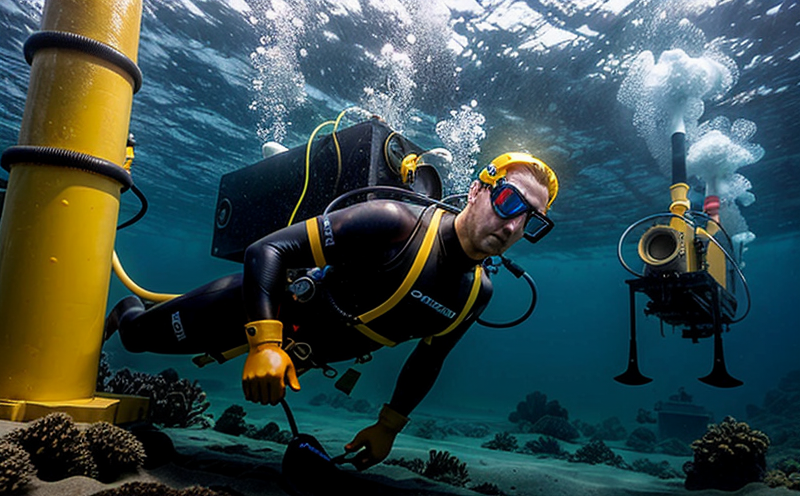ASTM D1141 Synthetic Seawater Corrosion Testing of Subsea Materials
The ASTM D1141 test method is a standardized procedure designed to evaluate the corrosion resistance of materials intended for subsea and underwater applications. This testing protocol simulates the corrosive environment encountered by subsea equipment, providing critical insights into material performance under real-world conditions.
Corrosion in subsea environments can be particularly challenging due to the presence of various aggressive species such as chloride ions, hydrogen sulfide (H₂S), and oxygen. These factors contribute significantly to the accelerated degradation of materials used in offshore structures, pipelines, and other equipment. ASTM D1141 aims to replicate these conditions through a synthetic seawater solution that contains chloride ions and other corrosive components.
The test method involves exposing specimens to this synthetic seawater under controlled conditions over an extended period. The primary objective is to assess the rate of corrosion, which can be quantified by measuring weight loss or changes in specimen dimensions after immersion. This data helps manufacturers and designers evaluate material suitability for subsea applications before full-scale deployment.
The ASTM D1141 test is particularly relevant for materials like stainless steel, titanium alloys, and other high-performance metals used in the marine industry. By identifying potential corrosion issues early in the design process, this testing ensures that equipment can withstand harsh underwater environments without premature failure. This not only enhances operational safety but also extends the lifecycle of subsea assets.
For quality managers and compliance officers, ASTM D1141 is a vital tool for ensuring adherence to industry standards and regulatory requirements. In R&D contexts, it helps in material selection and optimization processes. For procurement teams, this test provides assurance that purchased materials meet the necessary performance criteria for subsea applications.
Testing Procedure
The ASTM D1141 test involves several key steps:
- Specimen Preparation: Specimens are typically cut to standard dimensions and cleaned according to the method's specifications.
- Solution Preparation: A synthetic seawater solution is prepared using a mixture of salt, chloride ions, and other necessary components.
- Immersion: Specimens are immersed in the synthetic seawater for a specified duration.
- Weighing: After immersion, specimens are removed, cleaned, and weighed to measure any weight loss due to corrosion.
The test can be conducted under various conditions, including varying temperature ranges and exposure times, depending on the specific application requirements. This flexibility allows for comprehensive evaluation of materials across different subsea environments.
Why It Matters
Corrosion in subsea equipment is a significant concern that can lead to costly downtime, increased maintenance costs, and even safety hazards. ASTM D1141 provides a reliable means of assessing material performance under simulated seawater conditions, thereby helping prevent these issues before they become critical.
The test ensures that materials used in subsea applications are durable and reliable, reducing the risk of unexpected failures. This not only enhances operational safety but also contributes to long-term cost savings by minimizing repair and replacement costs. By adhering to ASTM D1141 standards, manufacturers can demonstrate compliance with industry best practices and regulatory requirements.
Moreover, this testing method supports innovation in the marine sector by providing a platform for R&D teams to explore new materials and coatings that offer enhanced corrosion resistance. This continuous improvement is crucial for addressing evolving environmental challenges and meeting increasingly stringent safety standards.
Why Choose This Test
- Standardized Methodology: ASTM D1141 provides a consistent approach to testing, ensuring reliable results that can be replicated across different laboratories and over time.
- Comprehensive Evaluation: The test evaluates materials under conditions that closely mimic real-world subsea environments, providing accurate insights into long-term performance.
- Regulatory Compliance: ASTM D1141 ensures compliance with industry standards and regulatory requirements, facilitating easier market entry for products.
- Cost-Effective: By identifying potential issues early in the design process, this test can save significant costs associated with post-deployment failures.
- Innovation Support: The test method encourages research and development of new materials and coatings that offer improved corrosion resistance.
- Consistency Across Industries: ASTM D1141 is widely recognized in the marine industry, ensuring consistent testing practices across different subsea applications.
Customer Impact and Satisfaction
The use of ASTM D1141 synthetic seawater corrosion testing has a direct impact on customer satisfaction by addressing critical concerns related to material performance in harsh subsea environments. By ensuring that materials meet the necessary standards, this test helps manufacturers deliver reliable products that perform consistently under challenging conditions.
Customers benefit from reduced downtime and maintenance costs as well as enhanced safety and operational reliability. This aligns with broader industry goals of sustainability and cost efficiency, contributing to a more robust marine sector overall.
The results provided by ASTM D1141 are crucial for customers in making informed decisions about material selection and equipment design. They can rely on the test's accuracy and consistency, knowing that it provides a clear picture of potential corrosion risks and performance capabilities.





